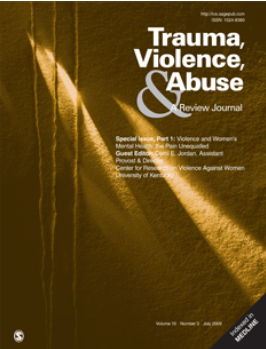穆斯林妇女遭受家庭暴力和虐待的经历:全球证据的元人类学研究
IF 5.4
1区 社会学
Q1 CRIMINOLOGY & PENOLOGY
引用次数: 0
摘要
家庭暴力和虐待(DVA)是由亲密伴侣或家庭成员实施的一种人际暴力。它包括身体虐待、性虐待、心理虐待、情感虐待和经济虐待,以及胁迫和控制行为。家庭暴力会给受害者带来严重的身体、心理、社会和经济后果。穆斯林妇女与所有社区的妇女一样,都会遭受各种形式的家庭暴力,但她们在寻求支持时可能会遇到更多障碍。本综述采用元民族志方法,综合了已发表的有关穆斯林妇女对家庭暴力的看法和经历的定性证据。在 Medline、CINAHL、Scopus、Web of Science、PsycINFO 和 ASSIA 等六个英文电子数据库中对全球证据进行了系统性检索,共发现 33 项符合纳入标准的定性研究。对这些研究的综述揭示了四大主题:虐待的经历和影响;导致虐待的风险因素;求助;以及穆斯林妇女的应对策略。这些研究结果强调了宗教的重要性,宗教不仅是导致暴力的风险因素和寻求帮助的障碍,也是应对暴力的一种策略。这些发现为制定政策和更有效地支持这些妇女提供了重要启示。本文章由计算机程序翻译,如有差异,请以英文原文为准。
Muslim Women’s Experiences of Domestic Violence and Abuse: A Meta-Ethnography of Global Evidence
Domestic violence and abuse (DVA) is a form of interpersonal violence perpetrated by intimate partners or family members. It includes physical, sexual, psychological, emotional, and economic abuse, as well as coercive and controlling behaviors. DVA is associated with severe physical, psychological, social, and economic consequences for the victims. Muslim women, like women from all communities, experience DVA in its various forms, however, they may experience additional barriers when seeking support. This review was conducted using a meta-ethnography approach to synthesize published qualitative evidence on Muslim women’s perspectives and experiences of DVA. A systematic search of global evidence in six electronic English databases including Medline, CINAHL, Scopus, Web of Science, PsycINFO, and ASSIA identified a total of 33 qualitative studies that met the inclusion criteria. The synthesis of these studies revealed four major themes: the experience and impacts of abuse; risk factors contributing to abuse; help-seeking; and the coping strategies of Muslim women. These findings emphasize the importance of religion not only as a risk factor for violence and a barrier to help-seeking but also as a coping strategy for dealing with violence. The findings offer important insights for policymaking and in supporting these women more effectively.
求助全文
通过发布文献求助,成功后即可免费获取论文全文。
去求助
来源期刊

Trauma Violence & Abuse
Multiple-
CiteScore
13.60
自引率
7.80%
发文量
131
期刊介绍:
Trauma, Violence, & Abuse is devoted to organizing, synthesizing, and expanding knowledge on all force of trauma, abuse, and violence. This peer-reviewed journal is practitioner oriented and will publish only reviews of research, conceptual or theoretical articles, and law review articles. Trauma, Violence, & Abuse is dedicated to professionals and advanced students in clinical training who work with any form of trauma, abuse, and violence. It is intended to compile knowledge that clearly affects practice, policy, and research.
 求助内容:
求助内容: 应助结果提醒方式:
应助结果提醒方式:


